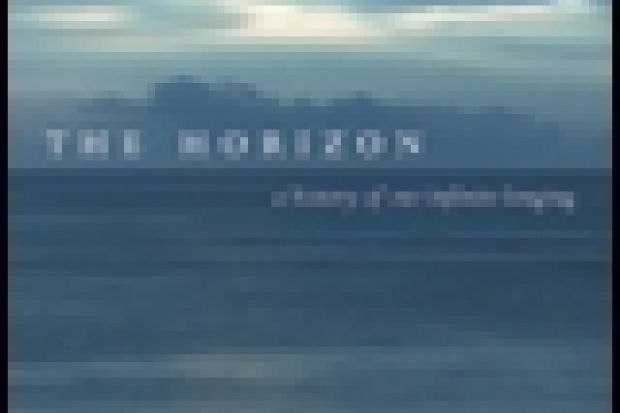What are the contemporary types of academic book? We are familiar with the detailed monograph (British Naval Shipyard Inventories 1855-1874), the best-seller (Everything You Wanted to Know about Jane Austen But Were too Afraid to Ask!) and the career-spanning magnum opus (Charles Taylor's A Secular Age lies, only three-quarters read, I'm ashamed to say, on my bedside table).
But Didier Maleuvre also remembers, and is inspired by, the stately books of a bygone age with "sonorous titles like 'Man's Place in the Cosmos'".
These books - at which, he writes, today's graduate students smirk - seem to pre-date our modern taxonomy of monograph, popular work and magnum opus, and yet somehow partake of all three. They seem to come from a different age of academic wisdom, authority and intellectual ambition. And, so inspired, Maleuvre has chosen to write a "retro" book. But I'm sad to say it is an example of why "retro" is no longer cool - if it ever was. Reading The Horizon is like going from The Wire to an episode of Dixon of Dock Green.
Perhaps the most important element in this "retro" experiment is the range. Maleuvre covers the whole of "the West" (that is, the ancient Middle East, Europe and then America) over 4,000 years. He packages it into six ages (archaic, philosophical, theological, scientific, subjective and finally the mathematical age), each subdivided into dated and titled chapters ("Permanence: Egypt, 2500 BCE"; "Trembling: Hippo, 410"; "Flatness: Murnau, Bavaria, 1908").
Of course he admits that no one could be an expert in all these areas and says he is following a sort of Walter Benjamin-style illumination of an instant, a circumstance, in each case. Except he doesn't. Each chapter - and they read more like ruminations or even sermons - wanders around, picking up ideas that vaguely match the overall theme, and then deserts them. This is not for one moment to decry this project's intellectual ambition, nor to argue that it could not be done in some way, but it is to point out that this book hasn't succeeded on its own terms.
However, if the chronological range is huge, the textual range is much smaller. The book really refers only to the "great books" view of the West, with a few added paintings and great cultural works. Just as one might wait for the Kennedy assassination episode to arrive in Mad Men, so one expects, say, St Augustine's Confessions, and, yes, here it is, bang on schedule. And here's Holderlin. And now Beckett. It is a very traditional canon, very Judaeo-Christian. Again, this isn't in itself a bad thing (except where, in places, this tradition goes proxy for all humanity) but it does illustrate the limits of the vision.
The problem of being "retro" also emerges in the book's tone. It's full - and I mean, packed to the brim - of unargued and enormous assertions. Sometimes these sound like the things one imagines professors in the 1950s would say to bobby-soxers and square-jawed campus men: this is "the most famous gesture in the history of Western Art"; or "the Christian self has no definite shape". Sometimes these sound like simplistic placeholders for the popular reader: the "drawback of the philosophical cast of mind is that it overlooks the tangible rarities of individual beings" (really? Is it?). And sometimes they just sound silly.
One is allowed to make generalisations, of course, and to draw big (here, the biggest) pictures. But there need to be strategies in place to enable this to happen seriously. For example, there might be a real sense of narrative that drives across the huge period and geographical range. Or there might be a more genuinely Benjaminian way of writing, focusing in great detail on one tiny aspect. Or, if one is far outside one's area of expertise, one treads more carefully, asserts less, and draws on the expertise of others.
All forms of academic books have their flaws (although their flaws are certainly also our flaws as readers). We find the detailed monograph too detailed and it misses the big picture; the popular book paints with too broad a brush; the magnum opus needs time (Charles Taylor's A Secular Age lies unread, etc). But the reason that no one writes books "like they used to", with the cosmos-spanning titles that so encouraged Maleuvre, is because today they don't work (or, to be scrupulous, they rarely work). That illusion, of knowledge, of intellectual ambition, of linking everything is - almost always - precisely that, an illusion. This is surely the lesson of "retro", if we stop for a movement to look: that it never was really like that.
The Horizon: A History of Our Infinite Longing
By Didier Maleuvre
University of California Press
392pp, £20.95
ISBN 9780520267435
Published 15 February 2011
Register to continue
Why register?
- Registration is free and only takes a moment
- Once registered, you can read 3 articles a month
- Sign up for our newsletter
Subscribe
Or subscribe for unlimited access to:
- Unlimited access to news, views, insights & reviews
- Digital editions
- Digital access to THE’s university and college rankings analysis
Already registered or a current subscriber?
